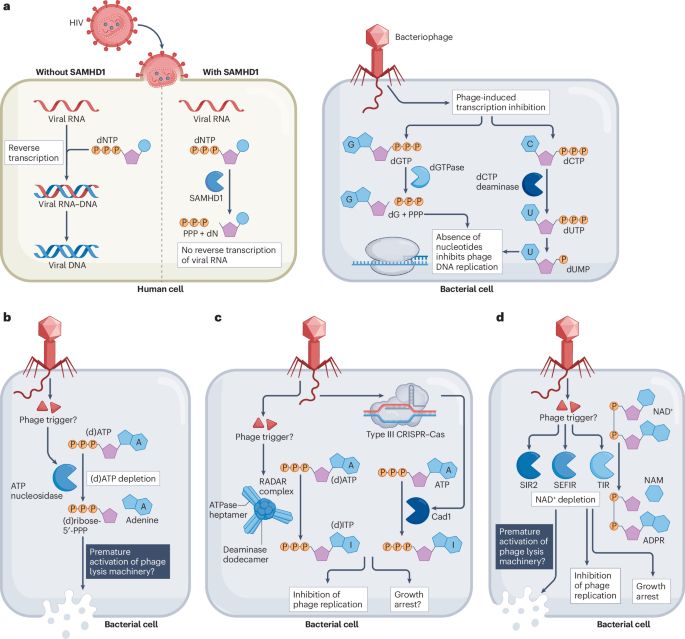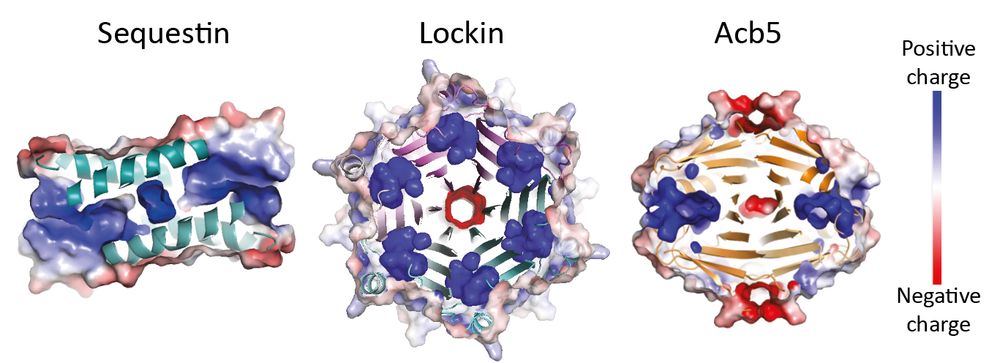Romi Hadary
@romihadary.bsky.social
PhD student @Soreklab.bsky.social @WeizmannScience
Studying phage-bacteria arms race🦠🛡️
Studying phage-bacteria arms race🦠🛡️
An incredible story revealing a novel defense system that senses DNA shredding during phage infection — beautifully solved by @ostermanilya.bsky.social ! 🧬✨
Bacteria can sense when a virus starts shredding their genome — by detecting methylated mononucleotides.
Here’s the story of how we discovered the Metis defense system 👇
www.biorxiv.org/content/10.1...
Here’s the story of how we discovered the Metis defense system 👇
www.biorxiv.org/content/10.1...

November 6, 2025 at 6:07 AM
An incredible story revealing a novel defense system that senses DNA shredding during phage infection — beautifully solved by @ostermanilya.bsky.social ! 🧬✨
Reposted by Romi Hadary
Today in @nature.com , we highlight how a cousin of CRISPR-Cas10, mCpol, establishes an evolutionary trap in anti-phage immune systems.
Check out @erinedoherty.bsky.social and my work from @doudna-lab.bsky.social lab here:
www.nature.com/articles/s41...
Check out @erinedoherty.bsky.social and my work from @doudna-lab.bsky.social lab here:
www.nature.com/articles/s41...

A miniature CRISPR–Cas10 enzyme confers immunity by inhibitory signalling - Nature
Panoptes, an anti-phage defence system against virus-mediated immune suppression, is revealed.
www.nature.com
October 1, 2025 at 5:57 PM
Today in @nature.com , we highlight how a cousin of CRISPR-Cas10, mCpol, establishes an evolutionary trap in anti-phage immune systems.
Check out @erinedoherty.bsky.social and my work from @doudna-lab.bsky.social lab here:
www.nature.com/articles/s41...
Check out @erinedoherty.bsky.social and my work from @doudna-lab.bsky.social lab here:
www.nature.com/articles/s41...
Reposted by Romi Hadary
Our story describing the Panoptes bacterial immune defense system is now finally peer-reviewed and published today! www.nature.com/articles/s41...

The Panoptes system uses decoy cyclic nucleotides to defend against phage - Nature
The Panoptes antiphage system defends bacteria by detecting phage-encoded counter-defences that sequester cyclic nucleotide signals, triggering membrane disruption and highlighting a broader strategy of sensing immune evasion through second-messenger surveillance.
www.nature.com
October 1, 2025 at 4:05 PM
Our story describing the Panoptes bacterial immune defense system is now finally peer-reviewed and published today! www.nature.com/articles/s41...
Reposted by Romi Hadary
Effector-triggered immunity (ETI) indirectly detects pathogen effector activity on the host cell.
Kevin Barthes,Tanita Wein and I examine how prokaryotic and eukaryotic viruses deploy similar effectors that activate ETI, underscoring its central role across the tree of life.
tinyurl.com/mr3a3xh2
Kevin Barthes,Tanita Wein and I examine how prokaryotic and eukaryotic viruses deploy similar effectors that activate ETI, underscoring its central role across the tree of life.
tinyurl.com/mr3a3xh2

Viral effectors trigger innate immunity across the tree of life | Philosophical Transactions of the Royal Society B: Biological Sciences
Viruses are ubiquitous biological entities that exert immense selective pressures
on their hosts, driving the evolution of diverse innate immune mechanisms across all
domains of life. While innate imm...
royalsocietypublishing.org
September 5, 2025 at 12:05 PM
Effector-triggered immunity (ETI) indirectly detects pathogen effector activity on the host cell.
Kevin Barthes,Tanita Wein and I examine how prokaryotic and eukaryotic viruses deploy similar effectors that activate ETI, underscoring its central role across the tree of life.
tinyurl.com/mr3a3xh2
Kevin Barthes,Tanita Wein and I examine how prokaryotic and eukaryotic viruses deploy similar effectors that activate ETI, underscoring its central role across the tree of life.
tinyurl.com/mr3a3xh2
Reposted by Romi Hadary
📢 New preprint alert!
We designed synthetic proteins that can block bacterial immune systems, allowing phages + plasmids to overcome natural defenses.
This could transform phage therapy + genetic engineering.
Here’s what we found 🧵
Preprint🔗: www.biorxiv.org/content/10.1...
We designed synthetic proteins that can block bacterial immune systems, allowing phages + plasmids to overcome natural defenses.
This could transform phage therapy + genetic engineering.
Here’s what we found 🧵
Preprint🔗: www.biorxiv.org/content/10.1...

Synthetically designed anti-defense proteins overcome barriers to bacterial transformation and phage infection
Bacterial defense systems present considerable barriers to both phage infection and plasmid transformation. These systems target mobile genetic elements, limiting the efficacy of bacteriophage-based t...
www.biorxiv.org
September 2, 2025 at 7:36 AM
📢 New preprint alert!
We designed synthetic proteins that can block bacterial immune systems, allowing phages + plasmids to overcome natural defenses.
This could transform phage therapy + genetic engineering.
Here’s what we found 🧵
Preprint🔗: www.biorxiv.org/content/10.1...
We designed synthetic proteins that can block bacterial immune systems, allowing phages + plasmids to overcome natural defenses.
This could transform phage therapy + genetic engineering.
Here’s what we found 🧵
Preprint🔗: www.biorxiv.org/content/10.1...
📢 Preprint out!
Together with @reneechang.bsky.social @kranzuschlab.bsky.social and the amazing @soreklab.bsky.social, we explored viral sponges to map their diversity and function.
Discovered huge diversity, including sponges that inhibit Pycsar & Type IV Thoeris!
www.biorxiv.org/content/10.1...
Together with @reneechang.bsky.social @kranzuschlab.bsky.social and the amazing @soreklab.bsky.social, we explored viral sponges to map their diversity and function.
Discovered huge diversity, including sponges that inhibit Pycsar & Type IV Thoeris!
www.biorxiv.org/content/10.1...

Functional diversity of phage sponge proteins that sequester host immune signals
Multiple bacterial immune systems, including CBASS, Thoeris, and Pycsar, employ signaling molecules that activate the immune response following phage infection. Phages counteract bacterial immune sign...
www.biorxiv.org
August 25, 2025 at 10:58 AM
📢 Preprint out!
Together with @reneechang.bsky.social @kranzuschlab.bsky.social and the amazing @soreklab.bsky.social, we explored viral sponges to map their diversity and function.
Discovered huge diversity, including sponges that inhibit Pycsar & Type IV Thoeris!
www.biorxiv.org/content/10.1...
Together with @reneechang.bsky.social @kranzuschlab.bsky.social and the amazing @soreklab.bsky.social, we explored viral sponges to map their diversity and function.
Discovered huge diversity, including sponges that inhibit Pycsar & Type IV Thoeris!
www.biorxiv.org/content/10.1...
Reposted by Romi Hadary
Excited to share my PhD work in the @kranzuschlab.bsky.social, out now in Molecular Cell @cp-molcell.bsky.social
We discover Acb4, a new family of viral sponges that sequesters nucleotide immune signals and defines molecular features that enable ligand specificity.
www.cell.com/molecular-ce...
We discover Acb4, a new family of viral sponges that sequesters nucleotide immune signals and defines molecular features that enable ligand specificity.
www.cell.com/molecular-ce...

A widespread family of viral sponge proteins reveals specific inhibition of nucleotide signals in anti-phage defense
Chang et al. discover anti-CBASS 4 (Acb4), a family of viral sponges that inhibits
bacterial immunity by sequestering nucleotide immune signals. Acb4 homologs in phages
that infect hosts across all ma...
www.cell.com
August 23, 2025 at 12:21 AM
Excited to share my PhD work in the @kranzuschlab.bsky.social, out now in Molecular Cell @cp-molcell.bsky.social
We discover Acb4, a new family of viral sponges that sequesters nucleotide immune signals and defines molecular features that enable ligand specificity.
www.cell.com/molecular-ce...
We discover Acb4, a new family of viral sponges that sequesters nucleotide immune signals and defines molecular features that enable ligand specificity.
www.cell.com/molecular-ce...
Reposted by Romi Hadary
The beautiful, ever-expanding universe of viral proteins targeting nucleotide immune signals!
Paper by @reneechang.bsky.social in @cp-molcell.bsky.social on a nucleotide sponge www.cell.com/molecular-ce...
and preprint by @doudna-lab.bsky.social on viral nucleases www.biorxiv.org/content/10.1...
Paper by @reneechang.bsky.social in @cp-molcell.bsky.social on a nucleotide sponge www.cell.com/molecular-ce...
and preprint by @doudna-lab.bsky.social on viral nucleases www.biorxiv.org/content/10.1...

A widespread family of viral sponge proteins reveals specific inhibition of nucleotide signals in anti-phage defense
Chang et al. discover anti-CBASS 4 (Acb4), a family of viral sponges that inhibits
bacterial immunity by sequestering nucleotide immune signals. Acb4 homologs in phages
that infect hosts across all ma...
www.cell.com
August 22, 2025 at 9:02 PM
The beautiful, ever-expanding universe of viral proteins targeting nucleotide immune signals!
Paper by @reneechang.bsky.social in @cp-molcell.bsky.social on a nucleotide sponge www.cell.com/molecular-ce...
and preprint by @doudna-lab.bsky.social on viral nucleases www.biorxiv.org/content/10.1...
Paper by @reneechang.bsky.social in @cp-molcell.bsky.social on a nucleotide sponge www.cell.com/molecular-ce...
and preprint by @doudna-lab.bsky.social on viral nucleases www.biorxiv.org/content/10.1...
A beautiful and much-needed review on the role of nucleotides in immunity, congrats Dina!! 💫🧬
Read my review with @soreklab.bsky.social on the nucleotide pool as a central playground in antiviral immunity across humans, bacteria and plants! 🧍♀️🦠🌿
& how viruses overcome these nucleotide-based immune mechanisms 🗡️
www.nature.com/articles/s41...
& how viruses overcome these nucleotide-based immune mechanisms 🗡️
www.nature.com/articles/s41...

Manipulation of the nucleotide pool in human, bacterial and plant immunity - Nature Reviews Immunology
Modification of the nucleotide pool is emerging as key to innate immunity in animals, plants and bacteria. This Review explains how immune pathways conserved from bacteria to humans manipulate the nuc...
www.nature.com
July 29, 2025 at 7:27 PM
A beautiful and much-needed review on the role of nucleotides in immunity, congrats Dina!! 💫🧬
Amazing work led by @nitzantal.bsky.social👩🏼🔬, identifying new immune inhibitors using structural clues. So excited to see this out! 🧬💫
📢Preprint out!
Excited to share my final work from the @soreklab.bsky.social!
We mined phage dark matter using structural features shared by anti-defense proteins (viral tools that help phages bypass bacterial immunity) to guide discovery.
Found 3 new families targeting immune signaling!
Excited to share my final work from the @soreklab.bsky.social!
We mined phage dark matter using structural features shared by anti-defense proteins (viral tools that help phages bypass bacterial immunity) to guide discovery.
Found 3 new families targeting immune signaling!

July 13, 2025 at 5:17 PM
Amazing work led by @nitzantal.bsky.social👩🏼🔬, identifying new immune inhibitors using structural clues. So excited to see this out! 🧬💫

